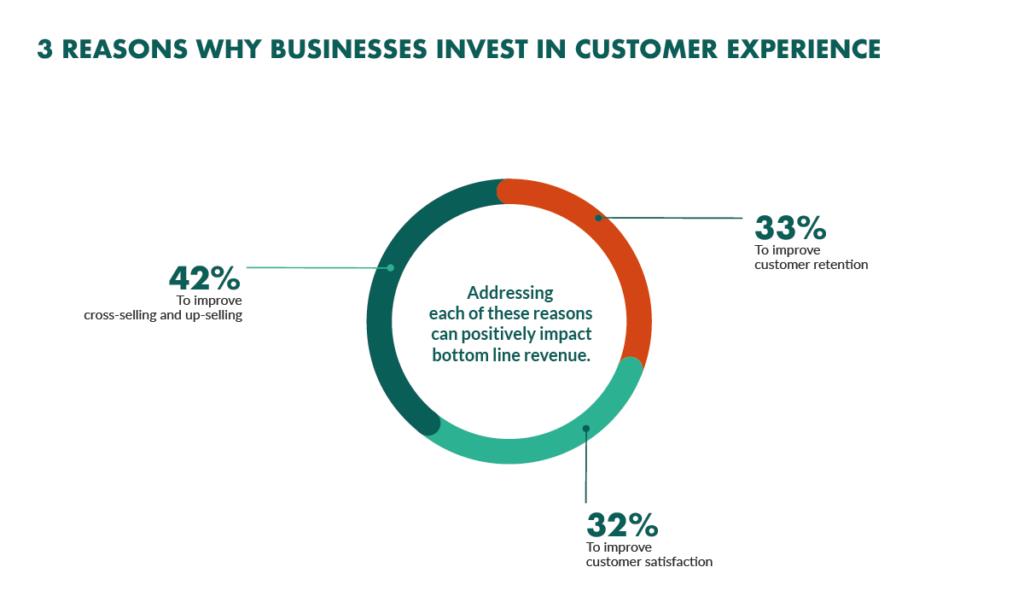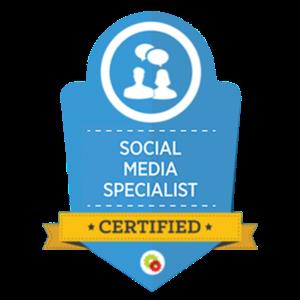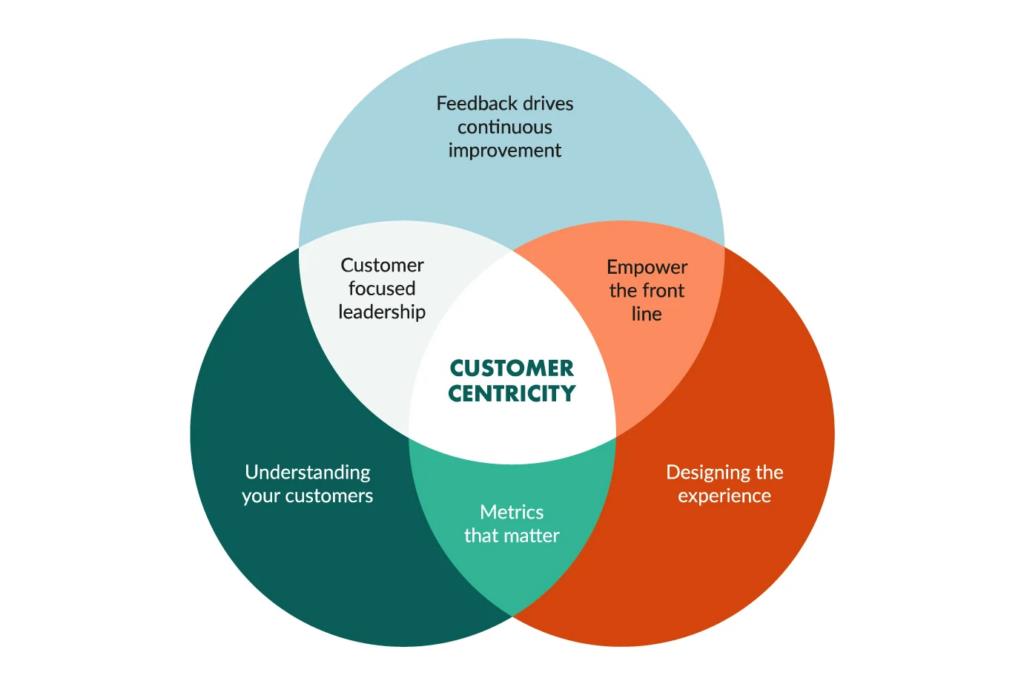
In modern business, standing out from the crowd isn’t easy. A strong brand-customer relationship is vital, as it drives customer loyalty and engagement. This can be the deciding factor in your business’s long-term success.
This article will explore the importance of your brand-customer relationship. We’ll explain how the four principles of brand management can help you build and maintain that relationship.
What is a Brand-Customer Relationship?

Your brand-customer relationship is the connection between your business and its customers. It’s influenced by various factors, but is essentially formed through the perception and reputation of your brand. You build this relationship on trust, loyalty, and engagement.
As well as the quality of the products or services you offer, your company’s reputation is also important. So is the customer’s overall experience with your brand. To put it simply, there are both tangible and intangible aspects to your brand-consumer relationship.
The tangible aspects include the quality of your products and services, as well as your sales, customer service, and support. We measure and affect the intangible parts of the brand-customer relationship with brand management.
Why is Brand-Customer Relationship Important?
It’s well-known that customer experience is one of the most critical factors in customer loyalty – and your brand-customer relationship is central to this. A good relationship encourages customer loyalty through engagement.

Customers who have a positive experience with your brand, and thus a strong brand-customer relationship, are more likely to recommend your company to others and make repeat purchases. This drives higher customer lifetime values and can grow your revenue through word-of-mouth and social sharing.
In addition, a solid brand-customer relationship helps to differentiate your business from its competitors. Positive associations with your brand make it easier for customers to identify and choose it over others.
The 4 Principles of Brand Management
So, now you know what we mean by a brand-customer relationship. But it probably still seems like a vague concept. Yet, whether you’re aware of it or not, you’re affecting it with everyday business decisions, advertising, and communications.
That’s why many established businesses have dedicated brand management teams to build consistency across your brand. These four overlapping principles guide brand management strategy. Measuring them will show you the state of your brand-customer relationship.
1. Awareness
This is how aware your target audience is of your brand versus others in your market. Think of synonymous brands such as Coke for soft drinks or Hoover for vacuums. These are the brands with the highest level of awareness in their respective areas.
Most businesses won’t become household names, but there are other ways to measure brand awareness. Analyzing organic searches for your brand name, as well as social media mentions, content shares, and so on, can give you a good idea of your audience’s awareness level.
That said, raising brand awareness isn’t just about getting your brand name in front of people. Increasing and maintaining awareness means you must also stand out in the customer’s memory. For brand managers, this means creating a unique brand personality for your business.
2. Reputation
Your reputation is what customers think about when they see your brand. This might be certain words or emotions they associate with your brand or product or a generally positive or negative sentiment.
This has a significant overlap with your brand awareness. If you’re not working on maintaining your brand reputation while growing awareness, you can spread negative sentiments and do more harm than good for your brand.
Building a positive reputation takes time. You can affect it through your communication, service, recruitment, and community projects. Your company culture, mission statement, and guiding principles can also tell external stakeholders about your reputation and values.

Are You Ready to Master Social Media?
Become a Certified Social Media Specialist and learn the newest strategies (by social platform) to draw organic traffic to your social media sites.
3. Loyalty
Research shows that loyal customers are five times more likely to make repeat purchases and four times more likely to recommend your business. That’s why customer loyalty is the goal of your efforts to improve your brand awareness and reputation.
Easier said than done? Perhaps. Customer loyalty can be challenging to build, partly because many customers look for different things to get their best experience out of a business. Some customers value convenience and price, while others want on-demand support.
For example, customers who come to your brand for value might appreciate your customer service measures such as a toll-free number or online text chat for inquiries. On the other hand, those looking for convenience might appreciate a premium-rate line that guarantees instant access to support.
That means that to increase customer loyalty, brand managers must analyze customer behavior and feedback. Personalization is a major driver of customer loyalty. When you listen to a customer’s needs and make changes based on feedback, you show that you value their contribution to your business.

4. Equity
Brand equity represents your brand’s perceived value. Think of it as the premium customers are willing to pay to access your brand over cheaper competitors. This leads to higher ROI on both new and developed products, as you can incorporate this into your pricing.
In his book, “Strategic Brand Management: Building, Measuring, and Managing Brand Equity”, author Kevin Lane Keller describes four key steps to building your brand equity:
- Establish your brand identity by identifying your target audience. Then, create your brand assets and stories around it.
- Define what your brand means. You do this by clearly stating your company values and through the projects you choose to support.
- Analyze how customers respond to your brand. What feelings and emotions does your brand evoke? Direct feedback and sentiment analysis are two good ways to judge this.
- Build your brand resonance by developing your existing customer relationships. Use your brand management to form deeper emotional connections with your customer base.
High customer satisfaction and customer loyalty are key indicators that your brand equity is rising.
How to Use Brand Management to Improve Customer Relations
Now you understand the principles of brand management, let’s look at how to use this in an everyday business setting to improve your customer relations.
Start With Brand Basics
If you’re new to brand management, the first step to improving customer relations is establishing a clear and consistent brand identity. This means developing a brand strategy, mission statement, and brand identity that aligns with your business’s values and goals.
You’ll also need to make key decisions about core brand assets like your logo design. Simple assets or slogans can be crucial in reinforcing the emotions and values you want customers to associate with your brand. Give these decisions the time and thought they deserve.
Share Your Stories
Whether we’re talking about your brand’s origin story, mission, or even employee journeys and customer testimonials, sharing these stories will help you make deeper emotional connections with your customers.
For example, many companies make support content like video tutorials for their products. But one way to make your customers feel more connected to this process is to share user-generated content with success tips and product guides.
Optimize Your Online Visibility
In today’s digital age, your business needs to have a strong online presence. Optimizing your online visibility can increase brand awareness and reach more customers.
This includes developing a website and creating social media profiles, as well as covering other basics like listing your brand in online directories and review sites.
Create an Internal Branding Guide
A strong brand identity is not just built by communicating with customers. You also need to ensure that employees understand and align with the company’s branding efforts. You can achieve this by creating an internal branding guide.
Use this as a reference for all employees to ensure consistency in tone of voice and other branding markers for all departments.
Focus on Your Customer Journey
It’s vital to understand how customers interact with your brand, from the awareness stage to post-purchase. By understanding the customer value journey, you can identify areas for improvement and tailor your branding efforts to meet the needs of your customers at each stage.

Engage Your Customers on Their Terms
Engaging with your customers on the channels they prefer is crucial to building a strong brand-customer relationship. Whether it’s social media, email, phone, or in-person interactions your audience prefers, make sure they can access your brand on those channels.
Personalize the Customer Experience
While we can fit customers into groups and demographics, each one is also unique. By analyzing a customer’s preferences as they interact with your business, you can give them a customer experience that meets their needs every time.
This can be small, simple, gestures. For example, give your priority customers access to a separate business phone number to speed up their support experience.
Analyze and Improve
Finally, to truly optimize your brand-customer relationship, you need to analyze your performance and make adjustments as you go. This includes tracking website traffic, monitoring social media engagement and sentiments, and analyzing customer feedback.

Are You Ready to Master Social Media?
Become a Certified Social Media Specialist and learn the newest strategies (by social platform) to draw organic traffic to your social media sites.
By using analytics, you can make data-driven decisions to improve customer relations and drive growth.
Final Thoughts: It’s all in the Details
Your brand-customer relationship goes deeper than your surface interactions with your customers. When we’re talking about subjective factors like emotion and engagement, the little details can make the biggest difference.
Even seemingly unrelated decisions like your choice of website hosting providers can have a knock-on effect. Does your domain name reflect your brand? Is it instantly recognizable to customers? When we think about it in these terms, it’s easy to see why a choice like this can have repercussions for your brand.
Effective brand management means you don’t have to fret about the small details of every decision. Having a clear brand strategy and documents like an internal branding guide help ensure consistency, even up to the decision-making level.
[TAG7]The post Key Steps for Building Strong Brand/Customer Relationships appeared first on DigitalMarketer.
Frequently Asked Questions
What are the rewards of being an entrepreneur?
Entrepreneurship has many advantages. The first is your ability to be self-reliant. You can stop relying upon others.
This makes you independent and free to pursue your dreams. You can also build relationships with other entrepreneurs, as you share the same challenges and interests.
You gain confidence. You're constantly learning new things as an entrepreneur. This will allow you to be flexible and adapt quickly. Thinking outside the box means you won't get stuck in a rut.
Our freedom to create our businesses is free from the restrictions imposed by society. We're free and able to decide what we do and how much we live.
You have the option to choose to go against the flow or follow the crowd. We have the option to choose success or failure. You have the choice to fail or win.
The freedom you have is exhilarating. You also have to take responsibility. This is because you are accountable for everything happening within your company once you have taken on this role.
You must be able to take risks if you want success. Don't be afraid to try new things. Your goal will be achieved if you are open to learning from your mistakes.
So, keep these lessons in mind when starting your journey.
Remember:
- Entrepreneurship can be a way to live your life.
- You're the boss when your business is owned and operated by you.
- Be careful of following fashion trends.
- You don't measure success in money. It is in freedom.
- You need to balance your personal life with your professional life.
- Set clear expectations.
- Always be truthful with your team.
- It is important to remember that if something is to happen, it must be done.
What are the 3 motivations of an entrepreneur?
The three main motivations of entrepreneurs are freedom, money and knowledge.
- Freedom is the freedom to do what you want, whenever you want. This is why entrepreneurs can be free from the constraints of our job or current life.
- Also, money is very important. Without it we would not consider starting a company. While we can survive on food, water, shelter and money, it is not possible to make ends meet without money.
- Knowledge is the third motivation. Entrepreneurship is a constant learning process. We often read books, attend seminars and take online courses to learn how to make products and services.
This is what makes us succeed and helps us achieve our goals. It gives meaning and purpose to our lives.
These are the three main reasons we started our business. They are our main driving force that keeps us going day in and day out.
These three things might be the reason we pack up and leave. We will never be truly happy if these three things are missing.
How can entrepreneurs motivate staff?
Motivation can come from any source. Motivation doesn't have to come from a specific place. All that matters is that it motivates them. Motivation is key for any business, whether it's a carrot or stick approach.
A motivated employee is more likely to be productive and happy. If you want a team that performs better, give them the tools to feel empowered and engaged.
They must feel valued. They need to feel valued and able to learn. A place where they can freely share their ideas without fear of punishment.
A company culture that allows them to thrive and succeed. That's how you keep your most talented employees happy, satisfied, and productive.
To keep the culture alive, reward people who help you succeed. This means bonuses when goals are met, offering training opportunities, increasing pay raises, and providing perks such as health insurance.
Clear communication and direction are also essential. Everyone should know what's expected of him and why.
You must ensure that policies and procedures are clearly written and communicated. You should ensure that they are observed by someone.
Communication is essential. Keep your employees informed about the current state of the organization. Inform your team about what's going on and what's coming up.
Communication is vital. Looking after your team is the best way for you to stay ahead of the game. They will take care you.
A bad relationship with employees could lead to big problems. Studies have shown that companies with high employee engagement score higher in productivity and profitability than those struggling to retain their top performers.
It's important to remember that not all employees are willing to work at an equal pace. Some prefer working alone while others love to collaborate. There are different ways to motivate each individual, and it's up to you to find yours.
Some people may be more responsive to rewards than others, and some might prefer recognition. Whatever works for you, ensure it aligns with the company's goals.
The leader is ultimately responsible for setting the tone. Open-mindedness is key. Listen to your teammates. And remember, if you want something done right, you've got to do it yourself.
What makes a successful entrepreneur?
There are two types: those who make money and those that make time.
They approach their business differently. That is what makes them different. The difference between them is how they approach their business. Those who make more money are focused on making more money, while those who make more time are more focused on making more.
Money-makers are driven by financial freedom. Their goal is becoming and staying rich.
They are driven by greed and fear. They care little about the long term because they know that they will be set for life once they reach their goals.
This type of person is commonly referred to by the term "hustler". They have a focus on the bottom and are able to find ways of increasing revenue without regard to quality.
Some people make their own time. These entrepreneurs are driven by passion. They are driven by passion to create something lasting and meaningful.
Their motivation is altruistic. They are driven to achieve great things. They care about creating products or services that have a positive impact.
These people are often called dreamers. They are motivated by vision and inspiration. They understand that success takes hard work, perseverance, and dedication.
They are creative, which is the most important attribute of these entrepreneurs. They are constantly seeking out opportunities that haven't been done before.
They thrive on the unknown. This is why they are willing to spend hours researching an area of interest. They enjoy learning new things and are open-minded to exploring new ideas.
It is also why they are adaptable to changing situations. They are not afraid to get dirty and do whatever it takes in order to win. They don't like mediocrity.
Which type of entrepreneur is it? Are you driven to make money, or are you motivated to find meaning?
Congratulations if you answered both questions. You are a successful entrepreneur.
Over the years I have had the opportunity to meet many successful entrepreneurs. What struck me most was their passion for what they do.
Entrepreneurs are not defined solely by their monetary wealth. Their impact is what defines them.
Steve Jobs was a great example of philanthropic work, even though he wasn’t wealthy. He didn’t even own his first home until he was in the mid-40s.
His ability to create products that have changed the world was what gave him his wealth. This is what makes him unique.
It is not about accumulating wealth. It is not to create empires or amass wealth.
Your job is to build relationships with customers and partners. To build trust. To help others succeed.
To make an impact. It's your legacy. That's your legacy.
If you are interested in building a legacy that is meaningful, let's get started.
Here at Social Media University, we'll show you how to earn passive income online. How to market your business and make it grow automatically.
What motivations are there for entrepreneurs?
Entrepreneurs can choose from three types of motivation. Each type has its unique set of strengths as well as weaknesses.
External motivation is the most prevalent form of motivation. An individual wants more money. This motivation is often triggered by financial concerns.
External motivation is driven mostly by personal interest, ambition and desire. These types of motivation are very goal-oriented.
It is rare to find internal motivation. People with inner motivation are less likely to seek wealth. Instead, they aim for other goals, such as self-development or fulfillment.
People with internal motivation are frequently called "passionate" since they find satisfaction from their work.
Intuition is the most common type of motivation. Intrinsic motivation refers only to people who are motivated by the satisfaction and enjoyment that comes from working towards a particular goal.
Internal motivation is much more motivating than external or intrinsic motivation.
It comes from the inside. It's based on the belief in certain talents and abilities. These talents and abilities allow them to accomplish things that no one else could possibly do.
Realizing our talents and capabilities makes us happy and fulfilled. We feel like we're doing important work.
In essence, intrinsic motivation is what makes you happy. The joy that comes from knowing we can accomplish whatever we set our minds on is intrinsic motivation.
This sense of accomplishment is what keeps us going when things get tough.
You might even find it boring if you don’t enjoy what your doing.
Click here for more information about motivational entrepreneurship.
What are the six most important questions entrepreneurs should ask?
Motivation is the most important ingredient for any business. You won't get out of bed each morning if you don't have motivation. Without motivation, you'll struggle to finish projects. Without motivation, it's impossible to reach your goals. How can we find our motivation?
It is possible to ask yourself: "What motivates me?" It might surprise you to find out the answer. You may have been asking yourself the same question for years. This question is one of life's most rewarding rewards. It allows you to uncover your motivation.
There's nothing more motivating than discovering why you exist. You will then realize what drives yourself. Your purpose becomes clearer. Why do you care? You'll be more motivated if you can figure this out.
To find your motivation, you must look within. These questions will help you find your motivation.
- What am I passionate about?
- What makes my heart beat more quickly?
- What's the thing that makes me happy?
- What gives me butterflies in the stomach?
- What makes you feel alive?
- What keeps you coming back to your projects again and again?
Once you have the answers, you can identify your true motivations.
Motivation will be your strength through difficult times. It will provide you with strength when you are most in need. It will help you work harder. It will help you achieve success.
And if you're like me, you'll never stop wanting to know what your motivation is.
You might be surprised at what you find. You might be surprised by what you discover.
Statistics
- I shifted my motivational point from something huge (and undefined) to improve by just 1% each day. (carolroth.com)
- According to analysts, Johnson has high appeal in all four quadrants tracked at the multiplex: male, female, over-25 and under-25. (forbes.com)
- “If you look to lead, invest at least 40% of your time managing yourself – your ethics, character, principles, purpose, motivation, and conduct. (americanexpress.com)
- Our 10 years of research also shows that 75% of mentored entrepreneurs increased their revenue, and 82% of their businesses survived the first two years. (carolroth.com)
- “Life is 10% what happens to you and 90% how you react to it.” (oberlo.com)
External Links
businessinsider.com
- 101 Best Inspirational Quotes For Entrepreneurs
- SpaceX employees have almost impossible goals: Elon Musk
inc.com
cnbc.com
- This is Jeff Bezos’s inspirational quote he keeps on his fridge
- Richard Branson, the Billionaire: These 10 top tips will help you succeed
due.com
How To
Are You a TRUE Entrepreneur?
True entrepreneurs are those who create value for themselves as well as others. He is risk-averse, he creates businesses, and he earns money.
He doesn’t wait until someone offers him an opportunity. He is self-motivated and can do anything.
An entrepreneur who is truly successful knows how to make quick and effective decisions. He sees the problem clearly and finds creative solutions.
He sees little difference between life and business. Entrepreneurship to him isn't a job, it's a way to live.
True entrepreneurs never fear failure. Failure is part of the journey to success. True entrepreneurs thrive under pressure and embrace change.
They are driven to attain their goals and they never stop trying. They are passionate about what they do and enjoy creating value.
They aren't only looking to build profitable companies but they also want to make their lives and those of their families successful.
The next time you feel lost or unmotivated about whether it is worth starting your own company, consider this question:
"Am I a true entrepreneur?" If yes, go ahead and do something. If you answered no, perhaps it is time to rethink the direction of your career.
Did you miss our previous article...
https://consumernewsnetwork.com/technology-news/top-5-security-issues-for-marketing-professionals






